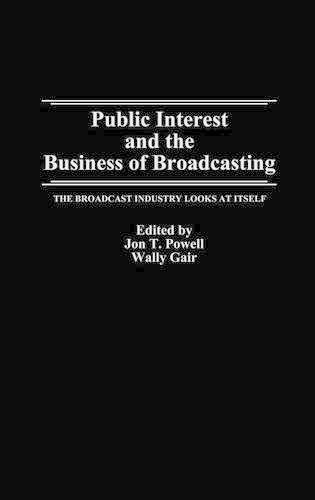
Public Interest and the Business of Broadcasting: The Broadcast Industry Looks at Itself
(Hardback)
Publishing Details
Public Interest and the Business of Broadcasting: The Broadcast Industry Looks at Itself
By (Author) Wally Gair
By (author) Jon Powell
Bloomsbury Publishing PLC
Praeger Publishers Inc
16th August 1988
United States
Classifications
Tertiary Education
Non Fiction
302.23440973
Physical Properties
Hardback
203
Description
This volume offers 16 essays, most original, offering varied broadcast industry views on the role of the public interest in changing business. Editors Powell and Gair, respectively a long-time member of the Northern Illinois University communications faculty and an Illinois broadcaster, provide a brief contextual introduction to each contribution and give the background of each author. The book, according to the preface, is intended to offer `candid and genuine descriptions of what the public-interest obligation actually means to the practitioner [broadcaster]'. . . . The volume is best seen as an indicator of the changing public-interest perceptions of broadcasters amid a rapidly changing marketplace. As such, it is useful for undergraduates interested in today's communications industry. Choice This volume presents a broad cross-section of views on an issue of central importance to the broadcast industry: Can the broadcast industry serve both the public interest and corporate and stockholder interest How do the leaders and successful professionals of the broadcast industry interpret and implement the public interest obligation A cross-section of American broadcasters--from network executives to small market radio station managers, from the president of the National Association of Broadcasters to a former FCC Chairman, from communications attorneys to retired broadcasters--offer personal interpretations of these and other questions on the public interest issue. Among the contributors are Arthur C. Nielsen, the retired Chairman of the A. C. Nielsen Company, which has been the arbiter of American network television success or failure since the advent of the medium; Edward O. Fritts, a small market radio group owner who became President of the National Association of Broadcasters; Newton N. Minow, a communications attorney who is perhaps the best remembered FCC Chairman because of his vast wasteland speech; broadcast pioneer and innovator Ward Quaal; and network insider Gene Jankowski, President, CBS broadcast group.
Reviews
"This volume offers 16 essays, most original, offering varied broadcast industry views on the role of the public interest in changing business. Editors Powell and Gair, respectively a long-time member of the Northern Illinois University communications faculty and an Illinois broadcaster, provide a brief contextual introduction to each contribution and give the background of each author. The book, according to the preface, is intended to offer candid and genuine descriptions of what the public-interest obligation actually means to the practitioner [broadcaster]'. . . . The volume is best seen as an indicator of the changing public-interest perceptions of broadcasters amid a rapidly changing interested in today's communications industry."-Choice
This volume offers 16 essays, most original, offering varied broadcast industry views on the role of the public interest in changing business. Editors Powell and Gair, respectively a long-time member of the Northern Illinois University communications faculty and an Illinois broadcaster, provide a brief contextual introduction to each contribution and give the background of each author. The book, according to the preface, is intended to offer candid and genuine descriptions of what the public-interest obligation actually means to the practitioner [broadcaster]'. . . . The volume is best seen as an indicator of the changing public-interest perceptions of broadcasters amid a rapidly changing interested in today's communications industry.-Choice
This volume presents a broad range of views on questions of central importance to the broadcast industry. A cross-section of American broadcasters offers personal interpretations of these and other questions on the public interest issue. The book is divided into three parts. The seven articles in part 1 provide the historical background to and the evolution of public interest, the audience, program ratings the business of broadcasting, federal regulations, and censorship. Part 2 applies the public interest concept to station operations in large, medium, and small markets. The authors discuss what public interest means, e.g., whether it means a strong sense of local identity, and, if so, how that local identity manifests itself in programming. Issues arising from advertising and access to the airwaves are covered in part 3. Included are papers on women's growing public interest role, women's role in broadcasting, no-fault public interest, and access by not-for-profit groups.-Communication Abstracts
"This volume presents a broad range of views on questions of central importance to the broadcast industry. A cross-section of American broadcasters offers personal interpretations of these and other questions on the public interest issue. The book is divided into three parts. The seven articles in part 1 provide the historical background to and the evolution of public interest, the audience, program ratings the business of broadcasting, federal regulations, and censorship. Part 2 applies the public interest concept to station operations in large, medium, and small markets. The authors discuss what public interest means, e.g., whether it means a strong sense of local identity, and, if so, how that local identity manifests itself in programming. Issues arising from advertising and access to the airwaves are covered in part 3. Included are papers on women's growing public interest role, women's role in broadcasting, no-fault public interest, and access by not-for-profit groups."-Communication Abstracts
Author Bio
JON T. POWELL is a Professor of Communication Studies and Instructional Technology at Northern Illinois University, Dekalb. WALLY GAIR has spent his working life in and around the broadcast media. From his first job as a newswriter at a radio station in Peoria, Illinois, to his past eight years as Executive Director of the Illinois Broadcasters Association.
